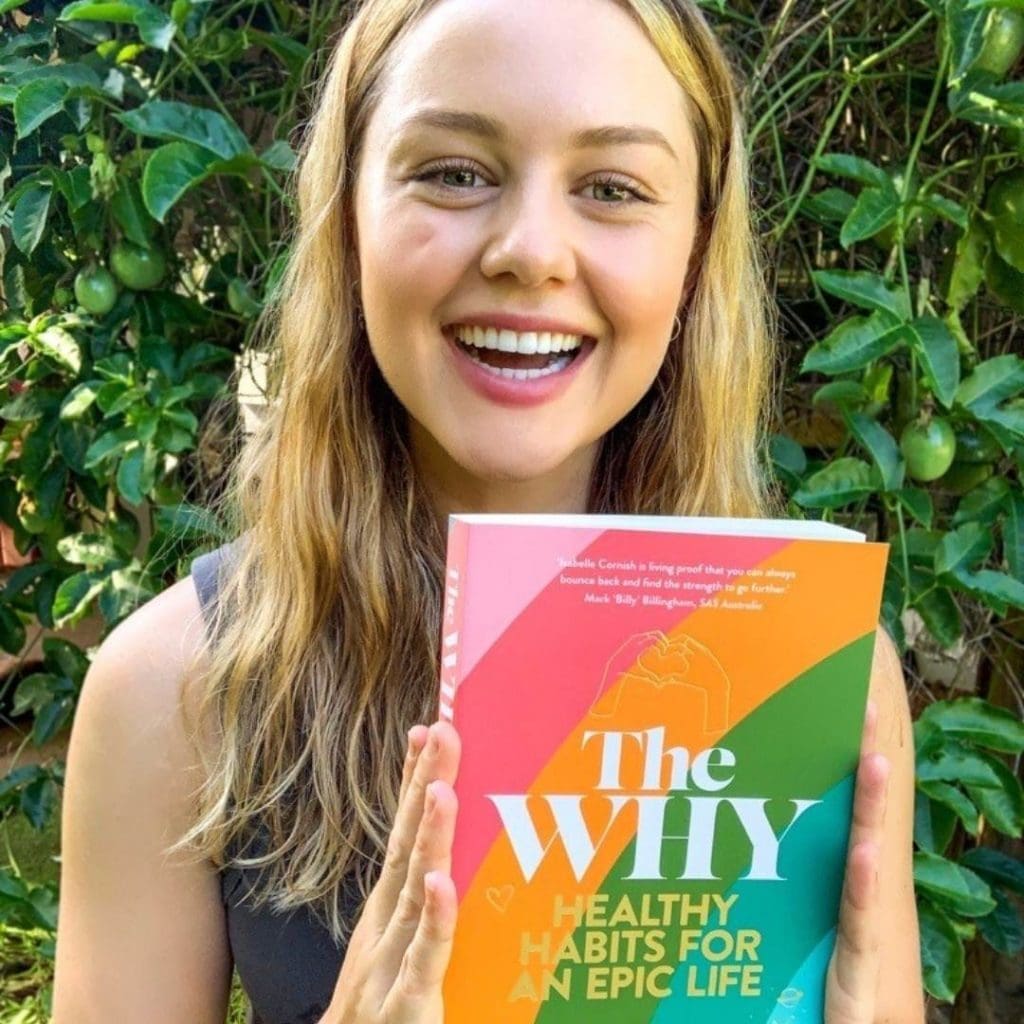TW: This story contains discussion of bulimia and disordered eating.
Actor, author and wellness advocate Isabelle Cornish has written a new book, titled The Why: Healthy Habits For An Epic Life, where she details the inspiration and lessons for how to look after your physical, mental and emotional health. Some of these lessons, she tells Capsule, she learned the hard way but she says there’s tremendous power in sharing your story when you know it can help others.
There’s a saying in book writing that you end up ‘writing the book you once needed to read,’ and for actor and wellness advocate Isabelle Cornish, that is spot on. Her debut book, The Why: Healthy Habits For An Epic Life, is a smart, funny and warm-hearted book about looking after your overall health, and it’s a book that, like its author, isn’t afraid to get vulnerable.

“I’ve always believed in the power of vulnerability, but I didn’t always have the levels of ‘okayness’ and love that I have now,” Isabelle says, chatting to Capsule via Zoom from her Byron Bay home. When asked who she was writing for, when she was working on the book, her answer is immediate.
“I wrote this book for the younger version of me, and all of those girls like me,” she says. “Originally I wanted to write it for women, and then I wanted to write it for everyone. It’s the book that I wish I had. I took myself back to that place where I was struggling and there was so much overload from the outside world: diet, strict exercise routines, everyone preaching a different, ‘perfect’ lifestyle.”
Acting runs in the Cornish family; Isabelle’s elder sibling Abbie Cornish is also a well-known actor. Isabelle herself started acting at a young age, with a role in Puberty Blues. She also went to join a modelling agency, and that’s when the body image noise got louder. In The Why, Isabelle writes about two agents telling her that she would fit in at the modelling agency, but her body was ‘too big.’
“I wrote this book for the younger version of me, and all of those girls like me.”
She was just 18 at the time, and writes about how the pressure to try and make herself smaller ended up in a year-long battle with bulimia, and then disordered eating. Her period stopped and she became isolated from her friends and family. They are not easy pages to read in the book, but they show just how far Isabelle has come, and how she learned to treat her body – and her mind – gently, as a result of this experience.
“It made me understand and reflect back on my teenage or childhood self,” she says. “When we’re young, we rejoice in our physical form – we don’t go, ‘Oh, I shouldn’t wear that,’ we’re kids, we wear whatever we want and we celebrate our form. I’m getting back to that essence inside me, which is undoing, not doing.”
It’s a line she writes in the food part of the book that sums up one of the main themes behind The Why. “All of us have the power to build, or rebuild, a healthier relationship with food,” she writes. “Sometimes the work is not so much about doing but rather undoing.” For anyone who has struggled with body image, that’s a very familiar idea – having to unlearn all the ways we’ve been taught to feel about our body.
Isabelle has a large online platform, as well as acting in high-profile roles like Nine Perfect Strangers, but she says she had no problem being so honest in her book, despite being in the public eye. “I feel comfortable sharing when I’ve learnt the lessons and I’m in the growth and wisdom phase,” she says. “If we share when we’re still in it, it might not help us. I think it’s important to share your own story, and I’ve shared it in a way that I was happy with. And books are awesome – it’s like a little time capsule of that decade, from my 16-year-old self to my 26-year-old self.”
“For me, creativity has been one of the best tools to combat a negative relationship with food”
Another thread that has been a consistent theme for this time is ADHD – Isabelle says she always suspected she had ADHD, but never really felt the need to get tested. It was during the process of writing the book that she finally did get an official diagnosis and because writing a book is no easy feat for anyone, she says it was important to share what’s possible with the right support. She jokes that she did write the book in about “250 different locations,” but she did get it done in the end – and having such a massive project to focus on for the first year of Covid-19 was a great distraction.
Creativity has long been Isabelle’s saving grace, she says. “For me, creativity has been one of the best tools to combat a negative relationship with food… I see issues with food as a symptom, right? Like a soul symptom. And then creativity is a tool that can allow our soul expression, allow our feelings to come out and it’s a healthy habit that we can use that also has a really positive impact on our food relationship. During the pandemic, I was in such a creative vortex; I was very lucky with my mental health and I’m very grateful for having a creative outlet through that time.”


